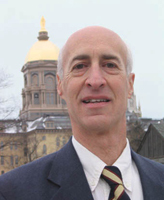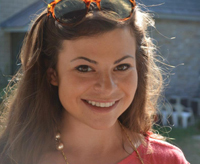
Students in Notre Dame’s Department of Political Science aren’t just reading about the latest research in the field—they are working alongside leading scholars to create it.
In the process, participants in the department’s Undergraduate Research Apprenticeship Program acquire invaluable experience and skills that will serve them no matter what path they choose after graduation, says Joshua Kaplan, the director of undergraduate studies.
“It’s part of our overall effort to provide a 21st century education, which can’t be limited to learning in the classroom,” he says. “We have to provide multiple opportunities for students to learn the tools of undergraduate research. That’s something that we are trying to foster more and more in our curriculum, and this apprenticeship program is one way to give students some practical experience.”
Research Mentors
Each spring for the last eight years, interested political science majors are paired, through an application process, with a professor to work on his or her research project for one credit per semester.
And the students are not just assistants, Kaplan says. They make a significant contribution to each professor’s work, and in some cases, the research project would be infeasible without a student’s assistance.
For example, he says, “the faculty who do a lot of statistical work also have a lot of coding to do. This is very labor intensive … and to have a group of students who are trained in how to do that is extremely valuable. It allows the faculty to accomplish more than they have time to do on their own.”
As apprentices, students get to experience political science research as it is done in the field, as opposed to the classroom. Working alongside renowned faculty, they learn a host of professional skills, such as how to properly collect data, manage strict deadlines and dense workloads, and work independently. And they are able to explore their interests more fully.
David Campbell, professor of political science and director of the Rooney Center for the Study of American Democracy, adds that students are also exposed to the “highs and lows” of real-world research.
“Not all of it is exciting. But the everyday drudgery is rewarded with the knowledge that you found something no one else has known or noticed before,” Campbell says.
Research Methods

This year, two of the students in the apprenticeship program—sophomore political science major Chris Newton and junior Annalee Rice, a political science and economics major—are helping to compile a database of democracies throughout history in conjunction with the Varieties of Democracy Project.
Led by Political Science Professor Michael Coppedge, a faculty fellow at the University’s Kellogg Institute for International Studies, the project is an international research collaborative working to discover better indicators of democracy. The team includes includes 15 social scientists and 2,000 country experts from around the world as well as two graduate students and 26 undergraduate research assistants from Notre Dame’s Department of Political Science.
“From seeing various methodologies at work to doing legitimate political science research, this project is helping to lay the foundations of essential skill sets I will need going forward,” Newton says.
But the apprenticeship program offers more than just a practical experience, Rice adds.
“I think research is absolutely vital to an undergraduate experience, not so much for adding to your resume but for capitalizing on the opportunity to pursue your intellectual interests,” she says.
Research Collaborations
Kim Plemel, a 2012 graduate who began the Ph.D. program in political science at Stanford University this fall, says the apprenticeship program prepared her for the challenges of graduate study, particularly coordinating with other researchers.
“I got my first exposure to how many decisions go into producing research,” she recalls. “Working independently, I think many of these decisions seem intuitive; however, it became clear to me that when co-authors and research assistants are involved, seemingly small decisions—such as whether to prioritize one substantive code over another—can have a big impact.
“This awareness has made me think about the details of research more deliberately,” Plemel says.
Given student interest and success in the program—and beyond—Kaplan says the apprenticeships have become a vital part of the department’s educational mission.
“Students want to do more—they want to do original, independent, and creative work,” he says. “And research is a way for them to make a contribution that’s uniquely theirs.”
Learn More >
- Undergraduate Research and Publishing Opportunities
- Joshua Kaplan faculty page
- David Campbell faculty page
- Michael Coppedge faculty page
- Varieties of Democracy Project
- Related story: Varieties of Democracy Project Awarded European Commission Funding